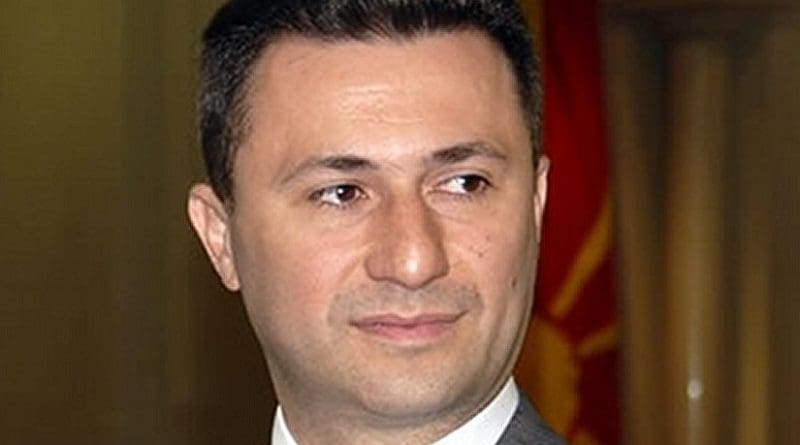Macedonia: Ex-PM Gruevski Back On Suspect List
By Sinisa Jakov Marusic
After the scrapping of presidential pardons for top politicians, Macedonia’s former Prime Minister Nikola Gruevski and his ministers are back on the Special Prosecution’s list of suspects to probe.
The Special Prosecution, SJO, said in a statement on Thursday that it has asked a court to impose “cautionary measures” on former Prime Minister and ruling VMRO DPMNE party leader Gruevski over a case in which he allegedly abused his official position.
The SJO did not reveal what the measures were or whether they mean that Gruevski’s movements should be restricted and his passport confiscated.
Gruevski, as well as his former Transport Minister, Mile Janakieski and the mayor of Gazi Baba, Toni Trajkovski, are suspected of abuse of office in the case known as ‘TNT’ for allegedly illegally knocking down a residential building owned by rival politician and businessman Fiat Canovski.
The three suspects were among those pardoned by President Gjorge Ivanov on April 12, so when it opened the case on April 21, the SJO said it could not launch a formal investigation.
It said however that it believed that the demolition, which cost Canovski over 14 million euros, was carried out “by the order and with the support of what was the highest state leadership”.
Ivanov, Monday, withdrew all 56 of the controversial pardons of top politicians and their associates which had sparked mass protests and deepened the country’s political crisis.
He made the move after facing criticism at home and from the EU and US, which said his actions undermined the rule of law.
The withdrawal of the pardons means that other former government ministers who were suspects in other cases are also now eligible once again for investigations.
The SJO also said that there are now no obstacles to investigating former Interior Minister Gordana Jankulovska and Transport Minister Mile Janakieski in the case dubbed ‘Titanic’, in which they are suspected of electoral violations.
There is also no obstacle to investigating the former head of the secret police, Gruevski’s cousin Saso Mijalkov, who was one of the suspects in the case knows as ‘Torture’, in which police officers and officials are being investigated for torturing former Interior Minister and stark government critic Ljube Boskoski during his arrest on June 6, 2011.
The same goes for the secret police commander Goran Grujoski who was a suspect in the case dubbed ‘Fortress’.
He is suspected of participating in the illegal destruction of police surveillance equipment last year, after the opposition published details of alleged illegal wiretapping, the SJO said.
The ongoing crisis in Macedonia revolves around opposition claims that the government, formerly led by Gruevski, was responsible for the illegal wiretapping of over 20,000 people, amongst other crimes.
Gruevski, who took power in 2006 and resigned as prime minister earlier this year under the terms of an EU-brokered accord reached last summer, claims that unnamed foreign intelligence services “fabricated” the wiretapping tapes and gave them to the opposition to destabilise the country.
Although the list of pardoned people by the president was dominated by officials from Gruevski’s VMRO DPMNE party, among those pardoned was also the head of the opposition Social Democrats, Zoran Zaev.
After the scrapping of the pardons, the SJO said that the case dubbed ‘Coup’, in which Zaev was accused of trying to blackmail Gruevski, demanding his resignation in exchange for not releasing details of the illegal wiretaps to the public, will also continue.
This case was launched last year by the regular prosecution, which many observers see as directly influenced by the ruling party, but was later transferred to the Special Prosecution.

